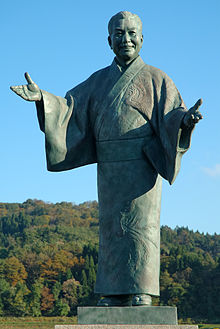- Haruo Minami
-
Haruo Minami (三波春夫 Minami Haruo, July 19, 1923 – April 14, 2001) was an enka singer in postwar Japan.
He was born Bunji Kitazume (北詰文司 Kitazume Bunji) in Nagaoka, Niigata. Hideo Murata was regarded as Minami's rival, as they both came from rōkyoku backgrounds.[1]
Contents
Career
In 1939, at the age of 16, Minami Haruo debuted as a performer of rōkyoku, a type of narrative singing, under the name Fumiwaka Nanju (南條文若 Nanjū Fumiwaka).
Minami joined the army in 1944 and was sent to Manchuria. He was captured by the red army and spent four years at a prisoner of war camp near Khabarovsk. He returned to Japan in 1949 and resumed his career as a rōkyoku singer.
He adopted his stage name in 1957 and started performing popular music (only later would his music be classified as enka, a term not in existence at the time of his debut). He attracted attention for performing while dressed in kimono, which was unheard of for male pop singers at the time.[1] Among his many hit songs was "Tokyo Gorin Ondo", the theme song of the 1964 Summer Olympics in Tokyo. It sold over one and a half million copies, and was awarded a gold disc.[2]
In 1992, Minami enjoyed a popularity resurgence when he performed the ending music for the Fuji Television series Super Zugan. Previously popular primarily among adults, enka music gained many younger fans due to this song.
On April 14, 2001, Minami died of prostate cancer at the age of 77.
Approach to audience
Haruo Minami is known for popularizing the saying "Okyakusama wa kamisama desu". It is directly translated, "the audience is kamisama", rather than "the customer is always right" or "the customer is a god". The kamisama is Japanese shintō's kami. When he sang his songs, he was concentrating as if to pray before kami. He looked on his audience as kami to make his performance perfect. The Minami's words were spread by Let's-Go-Sanbiki, a trio of Japanese comedian that had come to watch Minami's show.[3]
References
- ^ a b (Japanese) "訃報・三波春夫さん". Nikkan Sports. 2001-04-15. http://www.nikkansports.com/jinji/2001/seikyo010415.html. Retrieved 2009-05-14.
- ^ Murrells, Joseph (1978). The Book of Golden Discs (2nd ed.). London: Barrie and Jenkins Ltd. p. 179. ISBN 0-214-20512-6.
- ^ (Japanese) 「お客様は神様です」について (about "Okyakusama wa kamisama desu"). Haruo Minami official site.
External links
- Haruo Minami official site (Japanese)
Categories:- Japanese singer stubs
- Japanese musician stubs
- 1923 births
- 2001 deaths
- Japanese male singers
- Japanese anti-communists
- Japanese military personnel of World War II
- Japanese prisoners of war
- World War II prisoners of war held by the Soviet Union
- Enka musicians
- People from Niigata Prefecture
- Deaths from prostate cancer
Wikimedia Foundation. 2010.

